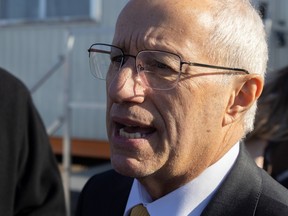The province is home to Ontario Shipbuilding and about 300 defense companies, including components and software manufacturers.

Contents of the article
OTTAWA — Ontario Economic Development Minister Vic Fedeli knows he needs to hurry to ensure new jobs are created through his province's defense industry ties – now that Ottawa is poised to move quickly toward major defense procurement.
Advertisement 2
Contents of the article
With the Navy about to place a rush order for submarines and Swedish defense firm Saab eyeing the prospect of assembling fighter jets in Canada, the race is on to secure defense-related industrial development and the good-paying jobs that go with it.
Contents of the article
Contents of the article
The top seller of Canada's most populous province visited the TKMS submarine yard in Kiel, Germany, earlier this month and plans to travel to the Hanwha shipyard in South Korea, likely in the new year.
TKMS and Hanwha are competitors for subcontracts from Canada.
“Depending on what lands here, obviously these things will be in the billions,” Fedeli told The Canadian Press.
“We are very pleased that the federal government is moving so quickly on the submarine contract that it has already narrowed the list of suppliers to two. And we are very much hearing that a decision could be made in early 2026.”
Contents of the article
Advertisement 3
Contents of the article
Ontario may not be the first province that comes to mind when thinking about submarines. The majority of the domestic economic benefits from the subcontract are expected to come from maintenance and support facilities on both coasts.
But the province is also home to Ontario Shipbuilding, formerly known as Heddle, and about 300 defense companies, including components and software makers.
Buying military supplies is not like looking for a new car. Companies bidding for major defense contracts are expected to invest in Canada – to secure contracts, prepare for future orders and expand supply chains.
Governments of countries with large defense contractors also tend to become directly involved through lobbying and efforts to soften contract proposals.
Advertisement 4
Contents of the article
Ontario has a large aerospace industry. At facilities in Mississauga near Pearson Airport, Bombardier is already assembling Global Eye surveillance aircraft in partnership with Saab.
In October, Fedeli traveled to Sweden for meetings with Saab, a lobbying move that comes as the federal government considers Saab's proposal to assemble Gripen fighter jets in Canada.
The prospect of a domestic Saab jet plant, although far from reality, suddenly appeared in a store window. Ottawa is reconsidering its plans to buy a fleet of F-35 jets in response to the trade war with the United States, a contract Saab once sought to win.
“We met with Saab representatives in Sweden and discussed the situation in Ontario if the federal government decides to purchase Gripens,” Fedeli said.
Advertisement 5
Contents of the article
“We reminded them that we make planes, trains and cars here in Ontario, we make chips… and we should be taken seriously as the site where Saab makes the Gripen.”
If such a project were to proceed, Ontario would undoubtedly face stiff competition from Quebec, which accounts for the bulk of Canada's aerospace jobs.
Ottawa is preparing to open the taps wide on defense spending. Prime Minister Mark Carney has said defense spending will eventually rise to reach five per cent of Canada's GDP, a level not seen since the 1950s and an increase of tens of billions of dollars each year.
As Canada seeks to join the ReArm Europe plan (a $1.3 trillion bid to build the European Union's defense industry) and Germany loosens its financial “debt brake” rules to pump billions into defense, Ontario senses an opportunity.
Advertisement 6
Contents of the article
“We want to be at the forefront of decision making,” Fedeli said.
“All of this is very attractive to the Ontario companies that we have, and we want to make sure that all of those companies in Europe and around the world are familiar with the expertise that Ontario already has in defense, including laboratories, aircraft and shipbuilding.”
Craig Stone, a defense economics expert at the Canadian Forces College, said Fedeli and his colleagues in other provinces will seek to provide foreign companies with information about Canadian firms they could partner with.
“There's room here for how much money the provincial government would put in when you think about what we've done for electric vehicles and batteries, for example when the province put money in to encourage a company to set up facilities in the province,” he said.
Last week, Vice Admiral Angus Topshey was in Berlin and Kiel, Germany, for meetings with TKMS. Secretary of State for Defense Acquisition Stephen Fuhr is expected to visit the Hanwha shipyard in January.
Hanwha Global Defense CEO Michael Coulter joked in an interview earlier this year that with so many officials keen to travel to the company's Geoje shipyard to see the advanced facilities where its KSS-III submarines are produced, the company should open a spin-off tourism operation.
Contents of the article







